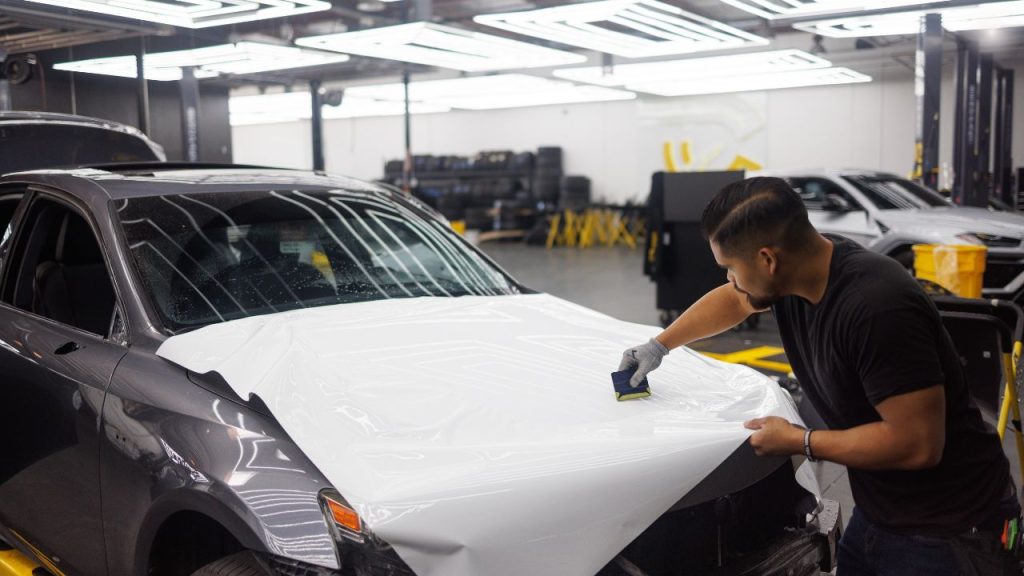Wrapping a car has become a popular way to change its appearance without the permanence of paint. Whether you’re looking to make a bold statement with an emerald green car wrap or simply protect your car’s original paint job, the process requires some planning.
One of the most frequently asked questions is, how much wrap do I need for my car? In this comprehensive guide, we’ll cover everything you need to know about measuring, estimating, and applying car wrap. We’ll also touch on how long does it take to wrap a car, which is a crucial factor in planning your project.
Understanding Car Wraps
Before we dive into the specifics, let’s briefly discuss what car wraps are. Car wraps are large vinyl decals that can be applied to the surface of a vehicle. They come in various colors, finishes, and patterns, allowing for extensive customization. The wrap serves as a protective layer against scratches and UV damage, preserving the underlying paint.
Factors to Consider
Several factors influence how much wrap you’ll need for your car:
1. Type of Vehicle
The size and type of your vehicle significantly impact the amount of wrap required. Smaller cars need less vinyl, while larger vehicles like SUVs, trucks, or vans will need more.
- Small Cars (e.g., Mini Cooper, Honda Fit): These typically require around 50-55 feet of vinyl.
- Mid-Sized Cars (e.g., Toyota Camry, Ford Fusion): These usually need about 60-65 feet of vinyl.
- Large Cars (e.g., SUVs, Trucks): These can require between 70-75 feet or more, depending on their size and shape.
2. Complexity of the Design
If your design includes multiple colors or intricate patterns, you might need more wrap to accommodate overlaps and potential errors during application.
3. Coverage Area
Decide if you want a full wrap or a partial wrap. A full wrap covers the entire vehicle, including mirrors and bumpers, whereas a partial wrap might only cover specific sections like the hood, roof, or doors.
4. Margins and Overlaps
It’s essential to account for extra material needed for wrapping around edges, doors, and other intricate parts of the car. A general rule of thumb is to add an extra 10-15% of the total wrap length to cover these areas.
How to Measure Your Car
To accurately determine how much wrap do I need for my car, you’ll need to measure your vehicle. Here’s a step-by-step guide:
1. Gather Tools
You’ll need a tape measure, notepad, and pen. It’s also helpful to have a second person to assist with measuring larger sections.
2. Measure Each Section
Break down your car into manageable sections: hood, roof, doors, fenders, bumpers, mirrors, and any other part you plan to wrap.
- Hood: Measure the width and length. For example, if the hood is 5 feet wide and 4 feet long, the area is 20 square feet.
- Roof: Measure similarly, ensuring you include any sunroof areas separately.
- Doors: Measure each door’s width and height, then multiply to get the area. Don’t forget the rear doors for SUVs and trucks.
- Fenders and Bumpers: These areas are trickier due to their curves. It’s often best to overestimate slightly to ensure you have enough material.
3. Total the Areas
Add up the areas of all the sections you’ve measured. This total will give you the square footage needed. Don’t forget to add the extra 10-15% for margins and overlaps.
Example Calculation
Let’s assume the following measurements for a mid-sized car:
- Hood: 20 square feet
- Roof: 20 square feet
- Front and Rear Doors: 40 square feet
- Fenders: 15 square feet
- Bumpers: 10 square feet
- Mirrors and Other Parts: 5 square feet
Total area = 20 + 20 + 40 + 15 + 10 + 5 = 110 square feet
Adding 10% for margins: 110 + 11 = 121 square feet
Thus, you would need approximately 121 square feet of wrap for a full coverage.
Buying Car Wrap
Car wraps are typically sold in rolls. A common roll size is 5 feet wide by 25 feet long, providing 125 square feet of vinyl. For the example above, one roll would suffice. However, it’s always wise to purchase a bit extra to account for any mistakes or miscalculations.
Cost Considerations
The cost of wrapping a car varies based on the type and quality of the vinyl. Here are some rough estimates for a full wrap:
- Standard Vinyl Wrap: $500-$1,000
- Premium Vinyl Wrap: $1,200-$2,000
- Specialty Vinyl Wrap (e.g., matte, satin, chrome): $2,000-$5,000
These prices are for the material alone. If you’re not doing the wrap yourself, labor costs can add an additional $1,000-$3,000 depending on the installer and complexity of the job.
DIY vs. Professional Installation
DIY Installation
Wrapping your car yourself can save money, but it requires time, patience, and skill. You’ll need a clean, dust-free environment and some specialized tools like a heat gun, squeegee, and utility knife. If you’re up for the challenge, there are plenty of tutorials available to guide you through the process.
Professional Installation
Hiring a professional ensures a high-quality finish and durability. Professionals have the experience and tools to handle complex curves and details. When considering how much does it cost to wrap a car black, professional installation can increase the overall cost, but it often results in a better, longer-lasting wrap.
How Long Does It Take to Wrap a Car?
The time required to wrap a car depends on the vehicle size, complexity, and the installer’s experience. For a standard vehicle, professional installers typically take 1-3 days to complete the job. DIY projects might take longer, especially for beginners.
Benefits of Wrapping Your Car
1. Aesthetic Flexibility
Car wraps offer a wide range of colors and finishes that paint cannot match. From gloss and matte to satin and chrome, the possibilities are endless.
2. Protection
Wraps protect your car’s original paint from UV rays, minor scratches, and other environmental damage. This can help maintain the vehicle’s resale value.
3. Reversibility
Unlike paint, wraps can be removed without damaging the original surface. This makes it easy to revert to the original color or switch to a new wrap whenever desired.
Choosing the Right Installer
If you decide to go with a professional installation, it’s crucial to choose the right installer. Look for:
- Experience: Choose an installer with a proven track record in car wraps.
- Reviews and References: Check customer reviews and ask for references.
- Portfolio: Review their portfolio to see past work and ensure it meets your standards.
- Warranty: A good installer should offer a warranty on their work.
Wrapping your car can be an exciting way to customize and protect it. Understanding how much wrap do I need for my car is crucial for budgeting and planning your project. By measuring your vehicle accurately and considering the factors mentioned, you can determine the right amount of wrap needed.
Whether you opt for a DIY approach or professional installation, a well-done wrap can transform your car’s appearance and offer lasting protection. Remember to factor in the costs, time, and benefits to make the best decision for your needs.




Pingback: Car Hood Wrap Cost: A Comprehensive Guide – Car Wrap Insights
Pingback: Gray Wrapped Car Ideas And Inspirations For A Stunning Look – Car Wrap Insights
Pingback: Experience The Richness Of An Emerald Green Car Wrap – Car Wrap Insights
I was looking at some of your blog posts on this internet site and
I believe this web site is real informative! Retain posting.Raise your business